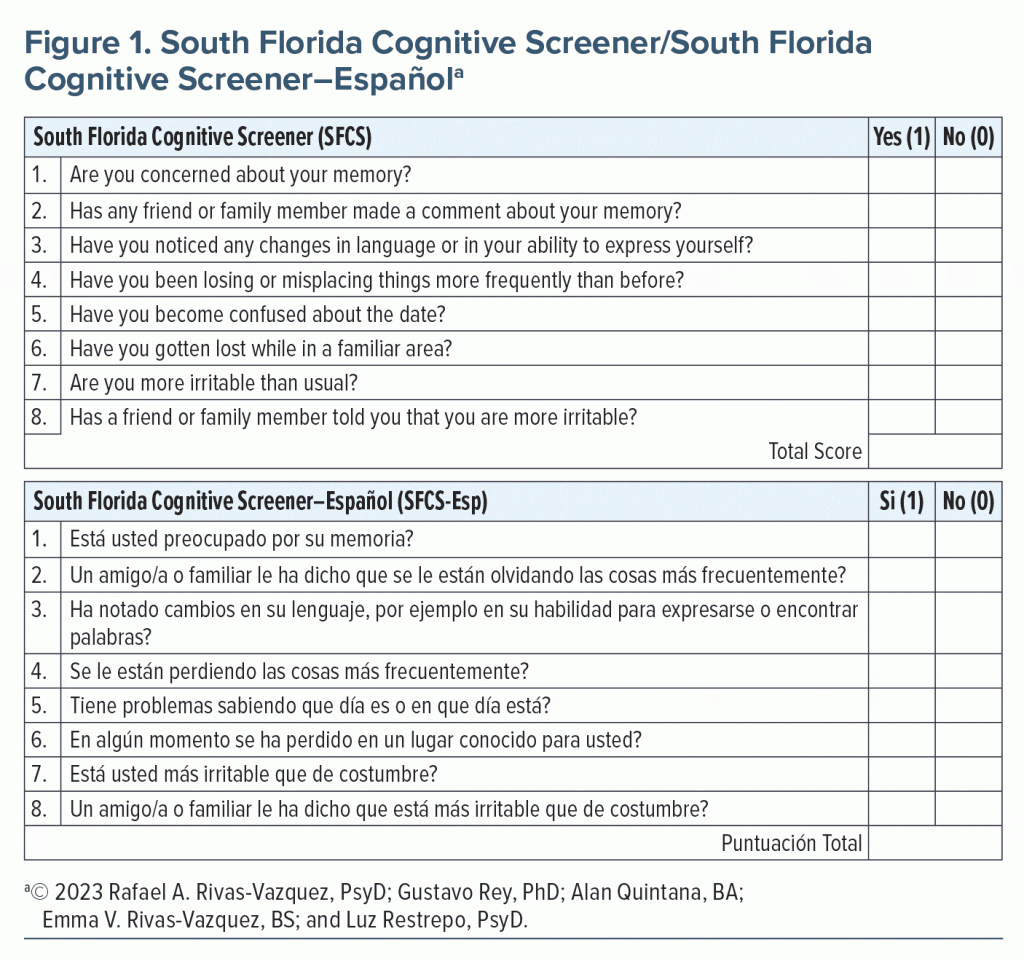It is estimated that the number of Americans aged ≥ 65—the segment of the population at greatest risk for developing neurocognitive disorders—will nearly double from 52 million in 2018 to 95 million by 2060, and their prevalence in the total population will increase from 16% to 23%.1,2 Many of these individuals have already begun demonstrating signs of cognitive dysfunction but have not yet been assessed for dementia—even those who have had recent contact with their physicians.3 Therefore, rapid detection of excessive cognitive decline is critical to provide earliest possible intervention aimed at mitigating functional decline, psychosocial hardship, and excess health care expenditure.
The South Florida Cognitive Screener (SFCS; Figure 1) is an 8-item self-report instrument that takes less than 3 minutes to complete. The SFCS was developed to capture the most common cognitive, functional, and behavioral complaints typically reported early in the process of cognitive decline. We administered the SFCS to 1,676 consecutive patients, aged ≥ 55, who were referred to an outpatient neurology practice in South Florida for routine cognitive assessment due to memory complaints (mean age [SD] = 73.8 [8.4]; sex, female = 980 (58.5%). We found that the SFCS correlates with the widely used cognitive screener, the Mini-Mental State Examination (MMSE)4 (r = −0.214, P < .001). Furthermore, a total score of 5 on the SFCS correlates with a MMSE score ≤ 25, generally considered to be the cutoff for cognitive impairment in a geriatric population. The SFCS was then translated into Spanish (SFCS-Esp) by a group of Hispanic practitioners representing various Latin American countries and who arrived at item consensus to minimize dialectical issues frequently encountered across Hispanic subgroups. Both English and Spanish formats demonstrate similar properties, with inverse-negative correlations with the MMSE (SFCS-Eng: N = 856, r = −0.183, P < .001; SFCS-Esp: N = 816, r = −0.236, P < .001).
To date, the SFCS and SFCS-Esp have been administered extensively in both primary care and neurologic settings. It has proved effective in detecting early manifestations of cognitive decline and serving as a catalyst for physicians to efficiently review and discuss cognitive status to better detect the presence of emerging dementia. We encourage physicians to incorporate this brief screening tool into their clinical practice.
Article Information
Published Online: December 12, 2023. https://doi.org/10.4088/PCC.23br03591
© 2023 Physicians Postgraduate Press, Inc.
Prim Care Companion CNS Disord 2023;25(6):23br03591
Submitted: June 28, 2023; accepted August 7, 2023.
To Cite: Rivas-Vazquez RA, Rey G, Quintana A, et al. Brief cognitive screener detects early signs of cognitive decline in Anglo and Hispanic patients. Prim Care Companion CNS Disord. 2023;25(6):23br03591.
Author Affiliations: First Choice Neurology, Miami, Florida (R. A. Rivas-Vazquez, Quintana, E. V. Rivas-Vazquez); University of Miami School of Medicine, Florida (Rey); Compass Counseling Services, Orlando, Florida (Restrepo).
Corresponding Author: Rafael A. Rivas-Vazquez, PsyD, First Choice Neurology, 8940 North Kendall Drive, Ste 802-E, Miami, FL 33176 ([email protected]).
Relevant Financial Relationships: None.
Funding/Support: None.
References (4)

- Population projections data. Census Bureau. Accessed July 20, 2023. https://www.census.gov
- Aging US population bulletin 1. Population Reference Bureau. Accessed July 20, 2023. https://www.prb.org
- Assessing cognitive impairment in older patients. National Institute on Aging. Accessed July 20, 2023. https://www.nia.nih.gov
- Folstein MF, Folstein SE, McHugh PR. “Mini-mental state”: a practical method for grading the cognitive state of patients for the clinician. J Psychiatr Res. 1975;12(3):189–198. PubMed CrossRef
Enjoy this premium PDF as part of your membership benefits!



